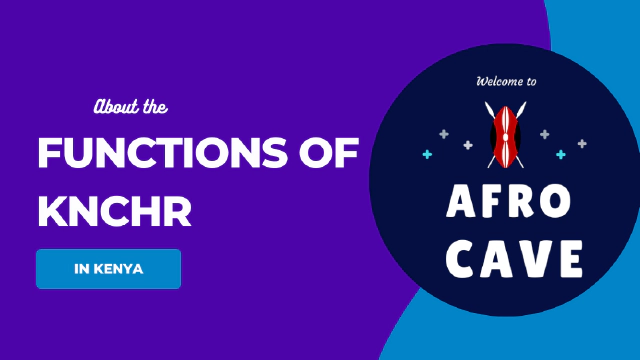The functions of the Kenya National Commission on Human Rights (KNCHR) are integrated into the Constitution of Kenya. The Kenya National Commission on Human Rights (KNCHR) is an independent National Human Rights Institution created by Article 59 of the Constitution of Kenya.
The Commission is established through an Act of Parliament (the Kenya National Commission on Human Rights Act). It is the state’s lead agency in the promotion and protection of human rights.
The Commission shall, pursuant to Article 59(5) (c) of the Constitution, be a commission within the meaning of Chapter Fifteen of the Constitution. Therefore, it shall have the status and powers of a Commission under that Chapter.
The Commission plays two key broad mandates;
- it acts as a watch-dog over the Government in the area of human rights.
- it provides key leadership in moving the country towards a human rights state.
The main functions of the Kenya National Commission on Human Rights (KNCHR) are to investigate and provide redress for human rights violations, to research and monitor the compliance of human rights norms and standards, to conduct human rights education, to facilitate training, campaigns and advocacy on human rights as well as collaborate with other stakeholders in Kenya.
Table of Contents Show/Hide
Functions of the Kenya National Commission on Human Rights (KNCHR)
Section 8 of the Kenya National Commission on Human Rights Act states that functions of the Kenya National Commission on Human Rights are to:
- promote respect for human rights and develop a culture of human rights in the Republic;
- promote the protection and observance of human rights in public and private institutions;
- monitor, investigate and report on the observance of human rights in all spheres of life in the Republic;
- receive and investigate complaints about alleged abuses of human rights, except those relating to the violation of the principle of equality and freedom from discriminations under the gender and equality commission, and take steps to secure appropriate redress where human rights have been violated;
- on its own initiative or on the basis of complaints investigate or research matter in respect to human rights, and make recommendations to improve the functioning of State organs;
- act as the principal organ of the State in ensuring compliance with obligations under international and regional treaties and conventions relating to human rights except those that relate to the rights of special interest groups protected under the law relating to equality and non-discrimination;
- formulate, implement and oversee programmes intended to raise public awareness of the rights and obligations of a citizen under the Constitution;
- work with the National Gender and Equality Commission and the Commission on Administrative Justice to ensure efficiency, effectiveness and complementarity in their activities and to establish mechanisms for referrals and collaboration;
- perform such other functions as the Commission may consider necessary for the promotion and protection of human rights;
- perform such other functions as the Constitution or any other written law may prescribe.
Powers of the Kenya National Commission on Human Rights (KNCHR)
According to Article 252 of the Kenyan Constitution, the Commission:
- may conduct investigations on its own initiative or on a complaint made by a member of the public;
- has the powers necessary for conciliation, mediation and negotiation;
- shall recruit its own staff; and
- may perform any functions and exercise any powers prescribed by legislation, in addition to the functions and powers conferred by this Constitution.
Article 253 of the Kenyan Constitution states that the commission-
- is a body corporate with perpetual succession and a seal, and
- is capable of suing and being sued in its corporate name.
In addition to the powers of a Commission under Article 253 of the Constitution, the Commission shall have the power to–
- acquire, hold, charge and dispose of movable and immovable property; and
- do or perform all such other things or acts for the proper discharge of its functions under the Constitution and the KNCHR Act as may lawfully be done or performed by a body corporate.
General Powers of the Commission
In addition to the powers conferred in Article 252 of the Constitution, the Commission shall have power to–
- issue summons as it deems necessary for the fulfilment of its mandate;
- require that statements be given under oath or affirmation and to administer such oath or affirmation;
- adjudicate on matters relating to human rights;
- obtain, by any lawful means, any information it considers relevant, including requisition of reports, records, documents and any information from any person, including governmental authorities, and to compel the production of such information for the proper discharge of its functions;
- by order of the court, enter upon any establishment or premises, and to enter upon any land or premises for any purpose material to the fulfilment of the mandate of the Commission and in particular, for the purpose of obtaining information, inspecting any property or taking copies of any documents, and for safeguarding any such property or document;
- interview any person or group of persons;
- subject to adequate provision being made to meet his or her expenses for the purpose, call upon any person to meet with the Commission or its staff, or to attend a session or hearing of the Commission, and to compel the attendance of any person who fails to respond to a request of the Commission to appear and to answer questions relevant to the subject matter of the session or hearing;
- conduct audits of any public or private institution to establish the level of compliance with the Constitution with regard to integrating the principle of equality and equity in its operations;
- require any public or private institution to provide any special report on matters relating to the institution’s implementation of the principle of equality and equity including gender equity.
Powers of a court
In the performance of its functions under the KNCHR Act, the Commission shall have the powers of a court to–
- issue summonses or other orders requiring the attendance of any person before the Commission and the production of any document or record relevant to any investigation by the Commission;
- question any person in respect of any subject matter under investigation before the Commission; and
- require any person to disclose any information within such person’s knowledge relevant to any investigation by the Commission.
Guiding principles of the Commission
In fulfilling its mandate, the Commission shall act in accordance with the values and principles set out in the Constitution and the Laws of Kenya, and shall observe and respect–
- the diversity of the people of Kenya;
- impartiality and gender equity;
- all treaties and conventions which have been ratified in Kenya and in particular the fact that human rights are indivisible, interdependent, interrelated and of equal importance for the dignity of all human beings; and
- the rules of natural justice.
For more about the functions of the Kenya National Commission on Human Rights (KNCHR), including membership and other provisions, see the Kenya National Commission on Human Rights Act(External Link) and its website knchr.org.

